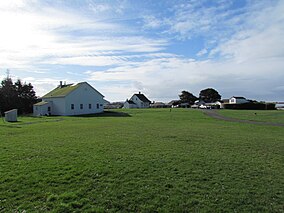Fort Humboldt State Historic Park
| Fort Humboldt State Historic Park | |
|---|---|

View of Fort Humboldt
|
|
| Location | Humboldt County, California, USA |
| Nearest city | Eureka, California |
| Coordinates | 40°46′37″N 124°11′20″W / 40.77694°N 124.18889°WCoordinates: 40°46′37″N 124°11′20″W / 40.77694°N 124.18889°W |
| Area | 18 acres (7.3 ha) |
| Established | 1955 |
| Governing body | |
| Reference no. | 154 |
California Department of Parks and Recreation
Fort Humboldt State Historic Park is a California state park, located in Eureka, California, United States. Displays interpret the former U.S. Army fort, which was staffed from 1853–1870, the interactions between European Americans and Native Americans in roughly the same period, and both logging equipment and local narrow gauge railroad history of the region. Within the collection, there are trains, logging equipment, including a fully functional Steam Donkey engine, and an authentic Native American dug-out canoe. The Fort overlooks Humboldt Bay from a commanding position atop a bluff. The North Coast regional headquarters of the California State Parks system is located onsite.
With the discovery of gold in the Trinity River in Trinity County in May 1849, the stage was set for conflict between the Native Americans who lived in northwestern California and the settlers and gold seekers that flooded into the region. After repeated depredations by white settlers, Northern California tribes such as the Yurok, Karuk, Wiyot, and Hupa retaliated and the Army was sent to attempt to restore order.
Fort Humboldt was established on January 30, 1853, by the Army as a buffer between Native Americans, gold-seekers and settlers under the command of Brevet Lieutenant Colonel Robert C. Buchanan of the U.S. 4th Infantry Regiment. Like Buchanan, many of the soldiers of this unit were veterans of the Mexican–American War. Starting about 1853, Seth Kinman was hired as a market hunter to supply elk meat to the fort. Fort Humboldt was sited on a strategic location on the bluff overlooking Humboldt Bay and Bucksport, a town named after David Buck, a member of the Josiah Gregg exploration party.
...
Wikipedia


